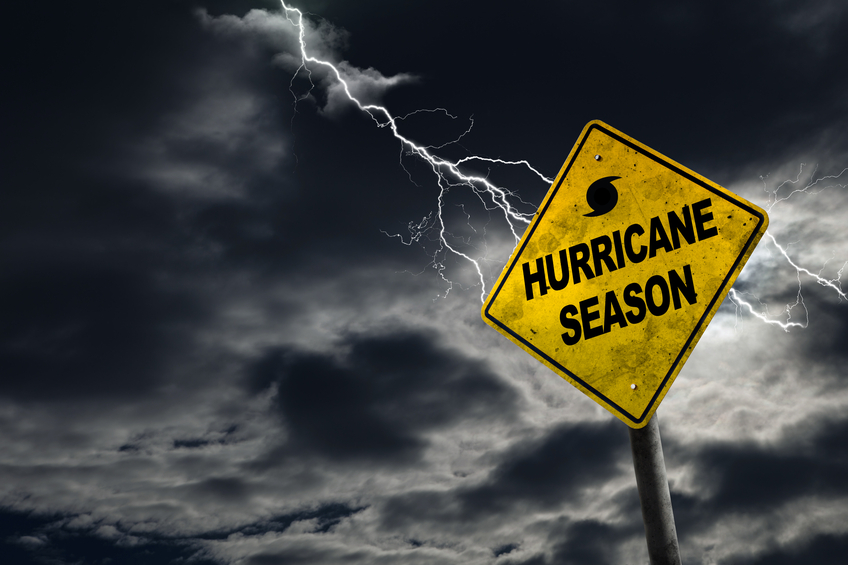While we’re all busy thinking about ways to safeguard ourselves, our families, and our businesses during the coronavirus pandemic, let’s not forget hurricane season is in full effect. It started June 1 and runs through November 30. Unfortunately, the National Oceanic and Atmospheric Administration (NOAA) has predicted a busy 2020 Atlantic hurricane season with a forecast of 13 to 19 named storms. There’s no time like the present to get prepared.

Where to Start
A comprehensive hurricane plan to protect your business is always a good start. Review the plan annually for needed changes and improvements. Before a storm hits, consider your risks: Can your business operate without computers, copiers, files, electricity, water, or Internet access? How will you make payroll? Will employees be able to get to work?
Next, develop a plan to address the risks and safeguard your employees, business, and equipment. Remember to order storm equipment and supplies early, such as batteries, water, file boxes (waterproof?), plastic sheeting, extra garbage bags, and duct tape. Here are other good steps to take:
- Update employee, client, customer, and vendor contact information and print copies in case you can’t access the material electronically. Remember, you may be forced to use cell phones and personal e-mail addresses to communicate during and after a storm.
- Designate an emergency response team and provide members with a list of employees for whom each is responsible for contacting after the storm has passed.
- Provide information on the company’s voicemail system and website so employees can check the status of the business’s operations and receive updates.
Hurricane FAQs
Hurricane-related questions begin to percolate this time of year. Here are a few you may be asking.
Many of my employees are currently working remotely because of the pandemic. What additional issues must I consider? Establish a policy for employees to follow regarding your expectations for securing and protecting any business equipment at their home, which may include locking file drawers, safeguarding papers, unplugging and turning off computers, covering equipment with plastic, and placing it in a safe place.
Do your essential employees have an analog telephone and landline available if the power is out? They also may need to have battery backups or chargers for their laptops and cell phones.
Do exempt employees get paid during a hurricane? Exempt employees are entitled to their entire weekly salary for any week in which they have performed work. If your business closes for a few days during a hurricane and the employee performed any work during that week, he is entitled to his entire weekly pay. You are permitted, however, to require the employee to use paid time off (PTO) for days when no work was performed, but if he has no unused PTO, you must pay him.
If your business remains open and an exempt employee chooses not to come to work, you don’t need to pay her for the day. You can treat the day off as a personal absence and either dock the full day’s pay or require her to substitute paid leave for the absence. If she does any work from home that day, you must pay her the full day’s salary.
What about nonexempt employees? Nonexempt employees must be paid for all hours they actually work, including any labor from home. Be sure to establish a good timekeeping policy, even for work at home and especially during a hurricane.
Keep in mind that if you can’t provide work to an employee because of a hurricane, you aren’t required to pay wages. But, as with exempt employees, any nonexempt employees paid under a fluctuating workweek salary must be paid their full weekly salary for any week in which they perform work.
What about waiting time? Employees are entitled to be paid for waiting time. If you ask an employee to go into work to wait for something (e.g., to turn on the air conditioning for a delivery), the time must be paid.
Can employees volunteer their time? Be wary of permitting employees to volunteer their help after a hurricane. You must pay them for the volunteer services if they’re performing any duties regularly performed by employees. Also, they must be paid for assisting with any office cleanup activities.
Can employees donate unused PTO to coworkers in need? Now is a good time to consider whether your business will permit PTO donations and, if so, what the implications may be. Have a policy and stick to it.
Must my business close during a hurricane? The Occupational Safety and Health Administration (OSHA) requires you to provide employees with a place of employment “free from recognizable hazards . . . likely to cause death or serious harm” to them. Use your best judgment to determine whether a hurricane would impose a substantial threat.
Keep in mind hurricanes don’t relieve you of the obligation to comply with the Americans with Disabilities Act (ADA), the Fair Labor Standards Act (FLSA), the Family and Medical Leave Act (FMLA), Title VII of the Civil Rights Act of 1964, and other laws. You must continue to pay employee wages, keep proper records, and make employment decisions free of unlawful discrimination.
Fingers Crossed
So far, seven proposed hurricanes turned out to just be tropical storms, but Tropical Storm Isaias is traveling up the East Coast and could turn into a hurricane by the end of Monday, which means we’ll be heading into peak hurricane season soon enough.
Glenn Rissman is a shareholder in the law firm of Stearns Weaver Miller Weissler Alhadeff & Sitterson, P.A., in Fort Lauderdale, Florida. You can reach him at grissman@stearnsweaver.com. Also contributing to the report was Lynn Derenthal, a paralegal in the same office.
